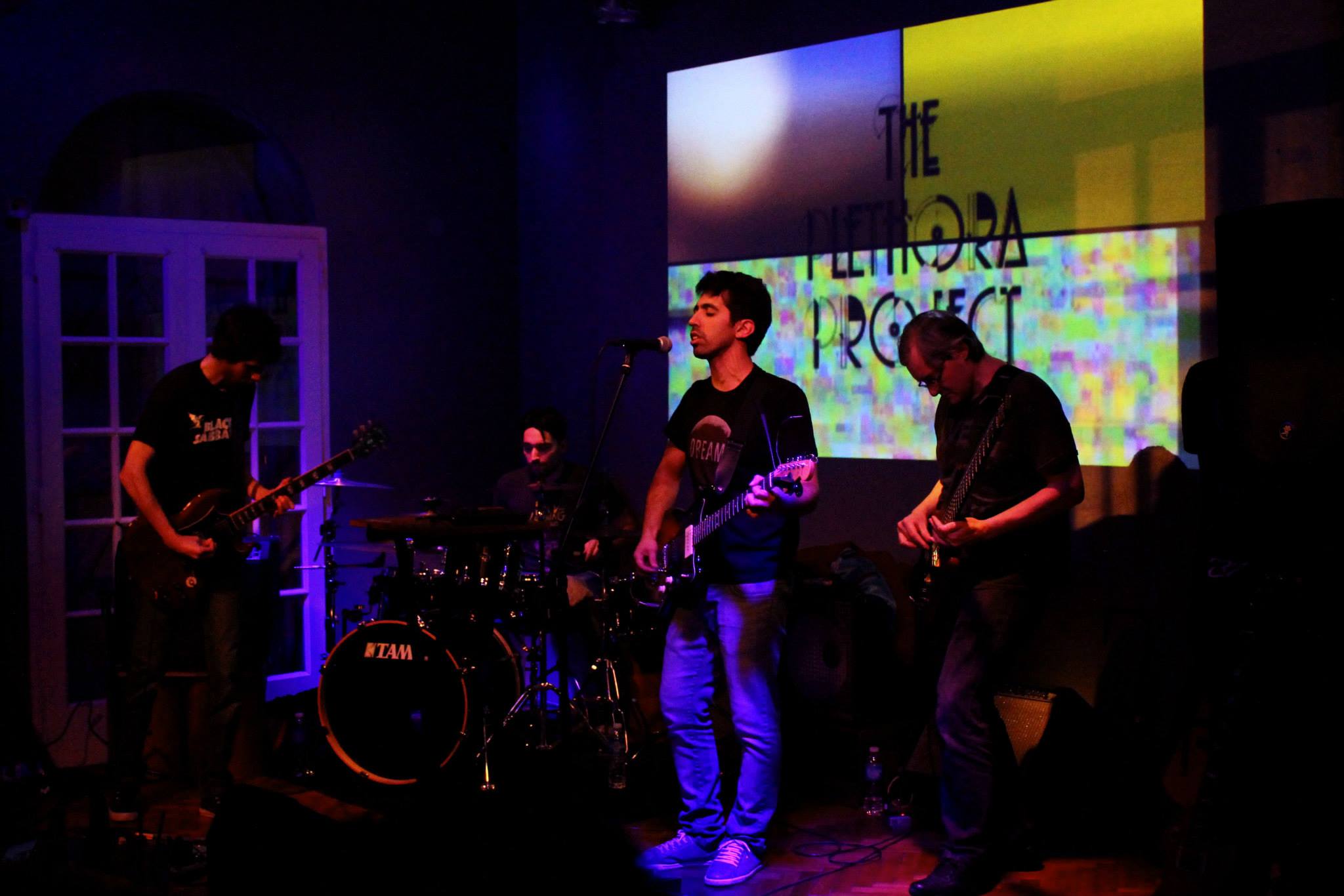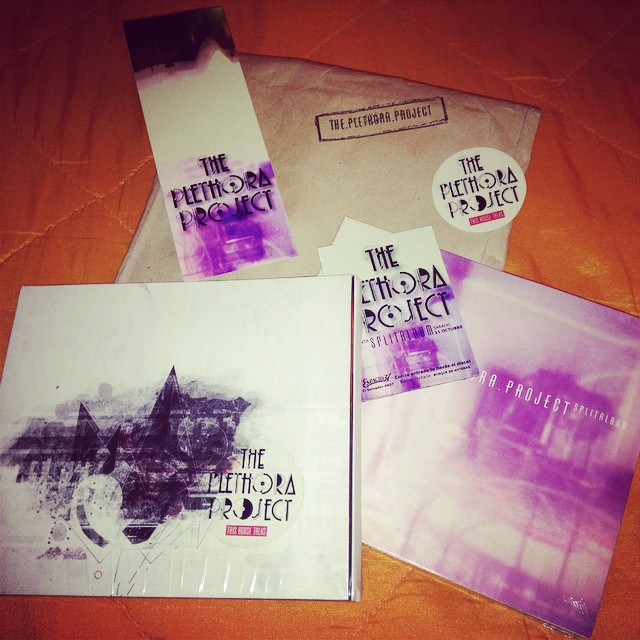During my last trip to Argentina I became acquainted with Javier Yunes, the founder and frontman of a band called The Plethora Project. The band is currently introducing audiences to its second record, “Split Album” – a collection of songs that converse back and forth among themselves, showcasing identical realities from opposing viewpoints. Javi is as much of a filmmaker as a musician, having studied art school in the past, so the full conversation with him keep that very same spirit alive – it fluctuated between different artistic conceptions until arriving at some sort of realization about the nature of what he has set to create, and how.
Thank you very much for being here today and sharing the story of your band with the readers of MusicKO. First of all, I’d like to ask you to introduce yourself, so that people who are new to your music will have a basic understanding of who you are, and how that translates into what you do.
Hey, I’m Javi Yunes from the Plethora Project. The band has been around for about ten years. In 2007, we had our first recording experience via a 4-song EP. Afterwards, in 2010/2011 we issued our first long play. It was named “This House Talks”. We were lucky enough to tour many Argentinean provinces, and nowadays we are introducing audiences to our newest record, which is called “Split Album”.
Which part of Argentina do you hail from?
I was born in Córdoba, and when I was three my parents moved to Catamarca. I lived there for fifteen years, I studied elementary and secondary school there, and then I came to Buenos Aires to get a sound degree, and keep moving towards my chosen path.
When was The Plethora Project started?
I moved to Buenos Aires in 2002. The Plethora Project came to be in 2005, after I had been on other bands. It started when I released an album bearing that same name. I listened to it the other day, incidentally. And I found myself thinking how cool it would be to record it exactly as it was, but with a better sound overall.
What makes your new album stand apart from your previous body of work?
This is our first record with both compositions in English and in Spanish – hence, the “split” Concept.
We have always sang in English. And we did so because of aesthetic reasons, it just fitted our music better. Yet, we understand that the language spoken here is Spanish. And this time around we could include it, and we feel it all coalesces together quite well.
Anyway, music is a language we all understand. And we strive to create a special mood. What we want is you to feel as if you were walking through a thousand different worlds when you are listening to our music. We aim to make your mind fly – and we’re not talking about drugs. I don’t believe I am entitled to “change” anybody’s mind, but what I want is to share a piece of mine with other people.
How much weight does your past as a film student has in your music?
I have ideas for music videos all the time, and I haven’t been able to carry thesse to completion just yet. But there’s a lot of images around.
I studied film for four years. I didn’t get a degree, I quitted. I decided to focus solely on this.
Is it accurate to say that music is a sort of pathway for you (and for others) towards discovering your inner self?
Indeed. It’s like a path. I’m not very talkative, people say that I speak very little. If you want to know me, you’ll do it through my songs. Yet, I always make the path a little intricate for you. From my language of choice to then the abstract nature of the lyrics, I’m the kind of person who can open up emotionally. But not always via words.
Can everything be subsumed under art? In your case, is each and every single incident liable to become a song?
I think so. I keep writing about these things that happen to me, from an innermost point of view. Everything can lead to a song.
Statistically, which topic has yielded the largest number of compositions? Love? Dreams? Music in itself?
Music in itself, I’d say. When I’m listening to songs, a lot of ideas arise. It has happened to me before that I listened to a song in English without really understanding the words, and it sent me on a trip that was unrelated to what the lyrics actually said. And interpersonal relationships are also significant source of inspiration, of course. These fears and desires that I have no other way of expressing always end up as songs.
Do you ever write as a character that can look at things from a different point of view?
There’s no song that focuses on any invented character, what we do is to narrate life from an unique perspective, which is our very own.
Radiohead is a reference that you always name, or (to be more accurate) reporters keep naming when you are being interviewed. How fair is that?
Yes, I think they name the band more than we do! [Laughs] Anyway, it’s an obvious association. And I think it’s great to be compared with such a band.
And which others influences can you identify? And I’m not talking about just music.
Painting has also got a lot to do with our band. If you look at the covers for our albums, they are full works in themselves. The first album shows a digital image by Alejo [Alejo Accini] and Javo [Javier Moreira ]of a city that doesn’t exist. And the second album’s cover is taken from a super 8 that’s more than 25 years old. We do everything with an artistic purpose.
And I’m very fond of theatre and literature as well.
What can you tell us about your newest album? What was its showcase event like?
The new album was officially presented on the 11th of October. It was great, a lot of people attended. We are very happy, Sergio Sosa from Bosque de Antenas [Forest Of Antennae] played with us, and friends from other bands (such as Mutandis and Sideria) also joined in.
Can you pinpoint the three songs that best represent what you have set out to achieve with “Split Album”?
“Chrome My Brain” reflects two of the main sides of the band pretty well, namely how its sound can explode and then become subdued. “Abrir Los Ojos” also.
And there is a song that I feel points towards tomorrow, which is called “Tenue y Ligero” [Dim and Light] which is based on loops.
And if I may, I would like to add yet another one: “Flies”, which is a quiet and pretty ballad.
How is the dialogue between songs structured? From side to side, or within each side?
Each side speaks to its opposite. For example, “Chrome My Brain” speaks with “Abre Los Ojos”, in the sense that “Chrome” deals with a human being which is lying on his bed, waiting for sleep to come. And what happens is that he sees himself splitting in two. There’s this theory which I’m fond of that says any individual can split into another, and see everything from a different point of view. And on that song, you are treated to what this person sees when looking at his other half. And there’s also a connection in the musical sense, wherein “Chrome” and “Abrir Los Ojos” share some riffs at the end. And when we are playing live, we actually start with one and end with the other, and it feels like coming full circle.
Which song off “This House Talks” would you like to turn into a music video?
It’s hard to pick just one song. The thing is, if I could shoot a video for every single song on the album I would do it. A strong contender has always been the third song on the album, “Abrir Los Ojos” [Open Up Your Eyes].
Which places would you like to tour next?
We would like to tour Uruguay and Chile. We have been to Chile before, as part of other bands, and we absolutely loved it. And there’s many provinces within Argentina that we are yet to play.
And in finishing, how would you define the experience of making music in Argentina based on all these things (good and bad) that have happened to you?
I feel one must become liberated from the fact of trying to get people to your show. For our latest album, they told me “put a photo of yourselves on the cover”. And I listen to what everybody has to say, but at the end of the day when you play live the people who are there are the ones who really want to listen to your music live. Nothing is impossible, we released two albums and having makes you whole as a person. It’s like having a son. So, making music in Argentina is not that complicated, but you must be gutsy and be persistent. And above everything – do what makes you feel good.
Listen to Split Album in full on the band’s website: http://theplethoraproject.com


